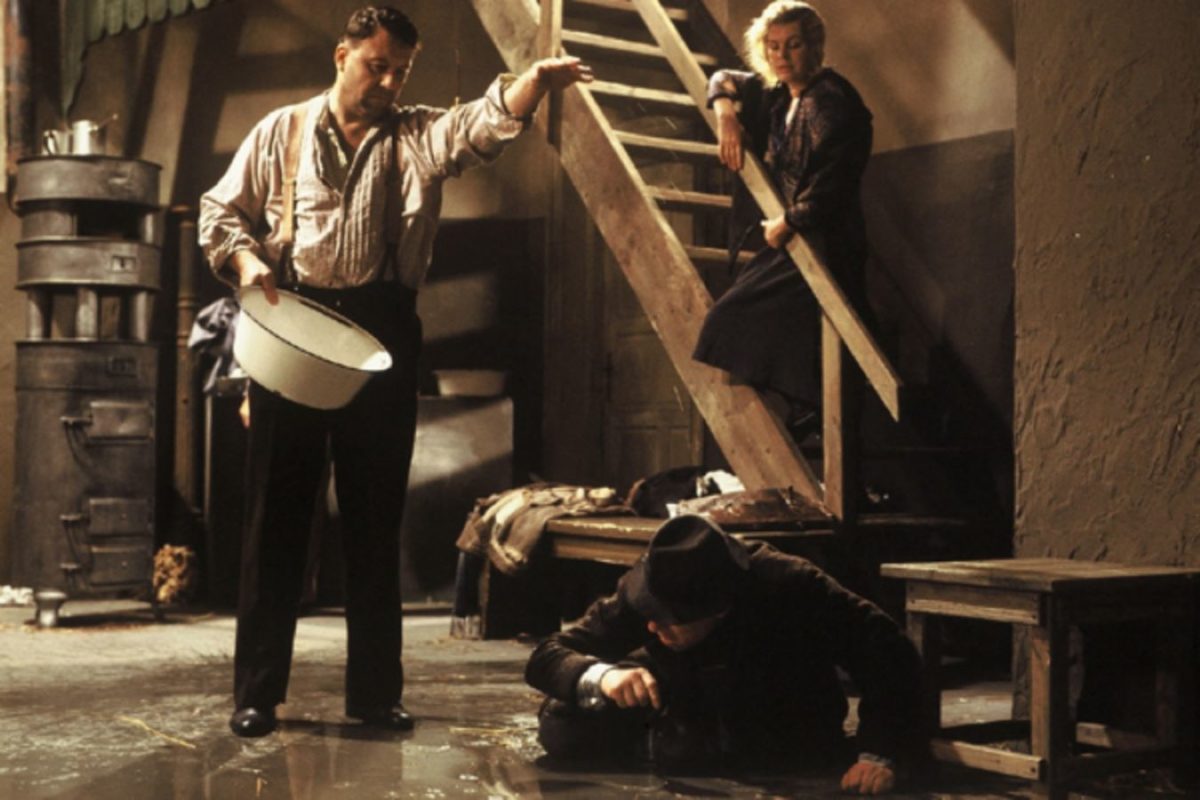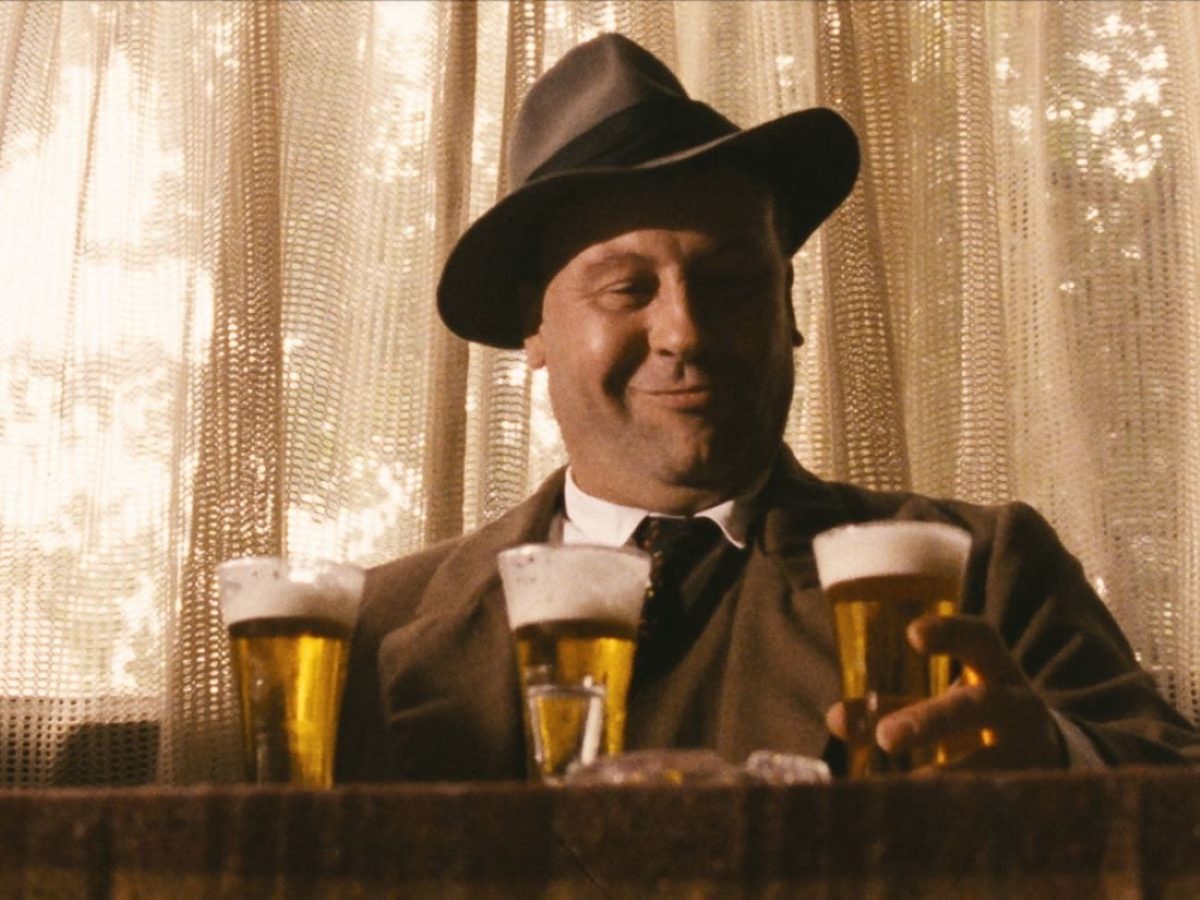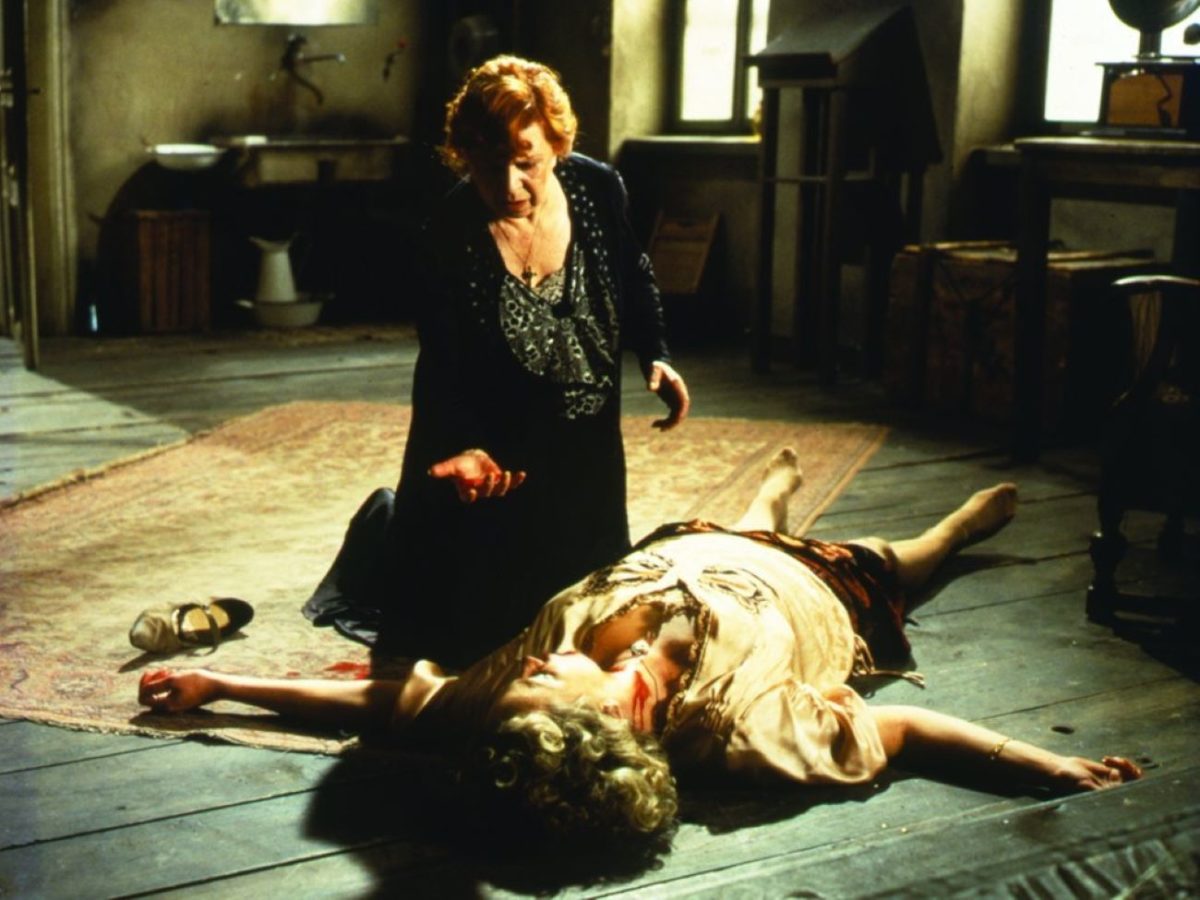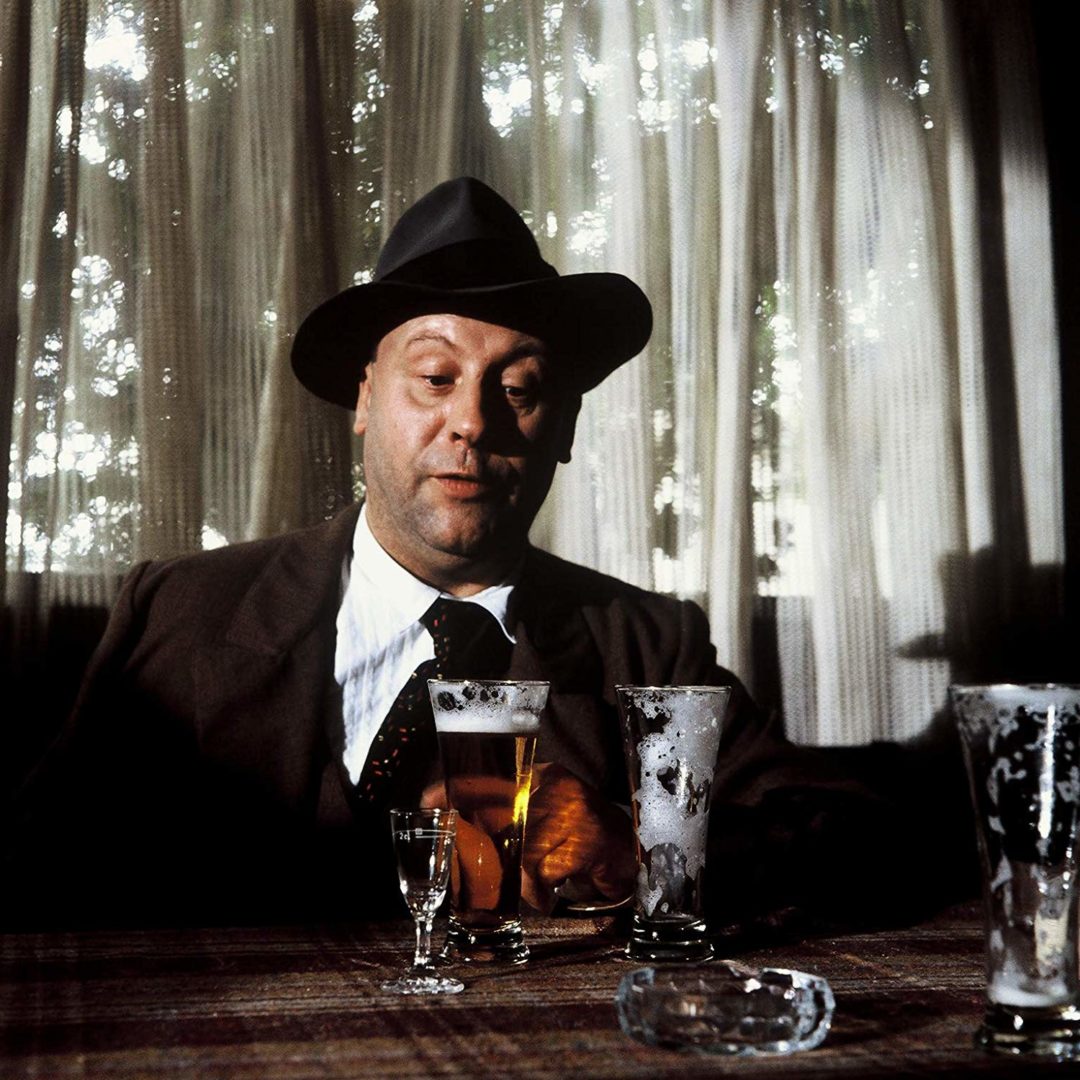A Monstrous Bastard
Has there ever been an artist who tackled his obsessions artistically as head-on as Rainer Werner Fassbinder did through his incessant celebration of the paradoxical emotional states that trap his subjects until they are devoured by them? Has there ever been an artistic endeavor that felt more like an exorcism than Berlin Alexanderplatz? How to describe the experience of watching this film in thirteen episodes and an epilogue?
In its scope, ambition and scale it reminds one of Wagner’s Ring des Nibelungen but seen through the radical specter of Stravinsky’s Frühlingsopfer, in the sheer amount of ideas per minute, the quickstep between banality and the sublime, the boring and the exciting, look no further than his fellow countrywoman Pina Bausch (a comparative study of the two of them seems long overdue). In its exhaustive tableau of human corporality one can’t help but think of Bruegel and Bosch and as a synthesis of the artist’s themes and obsessions brought together in a daring culmination we are driven to the shelves in our library which host The Brothers Karamazov and Doctor Faustus.
Yet how puny are these references attempting to domesticate an experience that is, in its essence, cinematic as only a made-for-TV film based on a novel that employs the most theatrical stylizations one can imagine, could be. Cinema as a monstrous bastard.
Time Out of Joint, or the Abundance of Experience
One of the most radical theatrical elements which defines the viewing experience during its fifteen-hour runtime is that of dramatic irony. The source novel by Alfred Döblin was published in 1929 and chronicles the lives and loves of Franz Biberkopf, a German Jedermann, by way of a city symphony spanning some two years of the twenties that would come to be known as the Weimar Republic; time and location being one and the same. Not unlike in its more famous Dubliner counterpart Ulysess, what manifests itself through the pages is a vista of a city in flux. Döblin famously proclaimed the rhythmic sounds of the tramways passing by his window as the main inspiration for the stylistic conception of the novel. He seems to not have been able to foresee (and how could he have?) the turn history would take in the beginning of the next decade, but of course we as viewers, almost a hundred years later—and especially Fassbinder who read the novel for the first time as a precarious teenager during das Wirtschaftswunder, hungry for experience of any kind—know and knew what would come after. As such, this life of Franz Biberkopf—extremely average in terms of the actual events it is made up of—gets an ominous glow because of the richness of its portrayal, as a vortex, of the past as his present and our future.

Walter Benjamin considered the detective novel the ultimate bourgeois art form because of its minute descriptions of the interiors the murders took place in (people were no longer simply killed on the streets) and just as Sherlock Holmes, whose collected adventures are advertised in one of the newspapers Biberkopf reads out loud, we, detectives of history, are looking for clues of a crime not yet committed. Because of the theatrical look of all interiors and streets in the movie (which I believe was completely shot in a studio since the Alexanderplatz of the title was destroyed by the Armageddon of the Second World War) every little detail seems to light up with meaning. And yet, it is unfair to bestow this meaning and the responsibility we cannot seem to separate from it, upon this life, just because we have the knowledge of what would come next. The trauma touched upon throughout this dynamic between individual experienced life and the history that surrounds it as a river—at the same time static and fluctuating—is the question of how to hold people accountable for these things we know now but which were far less clear back then.
Nevertheless; “we do not know” is always “we don’t want to know.”
The Subjects of Time, or the Center Cannot Hold
Even though Time may be the abstract, intellectual foundation of this film/series, it still had to be made palpable. This is unprecedentedly done through its embodiment of Franz Biberkopf by Günther Lamprecht, giving the performance of a lifetime.
His journey begins with his release from prison in the pilot episode, ironically entitled ‘The Punishment Begins’, setting in motion a cascade of events by swearing the oath he will never go back there. As soon as he steps over the threshold separating the confined spaces of prison from the no less confined but much more overwhelmingly vibrant streets of the city he has not seen in four years, Biberkopf seems dazzled by this new-found freedom that, apart from an obvious attack on the senses, is also a renewed negotiation with the experience of time. The structured incarceration he experienced for the last four years gives way to an abundance of sounds, colors, smells and, yes, also time. Freedom lies close to madness and not a lot of people can live up to the task of structuring their lives all by themselves. Imre Kertész wrote in his diaries that our obsessions with work might have to do with our fear of violence, not the violence that is committed towards us, but the violence we enact upon ourselves, I would add because of the ennui we mistake for freedom.
The negotiation with this abundance of time is also something Fassbinder mischievously tackled head-on in the structure of his series. We are familiar (and this word is telling us something here, conveying a secret kinship between television and family, both faculties of death) with the television series as being structured into episodes that each tell a somewhat evenly-distributed part of the story. The key narrative concern seems to be a balance of some sorts; every character and/or story needs to get its due during the episode and they should contribute to the bigger narrative arc but nevertheless feel dramatically coherent and exciting on their own. Not so for Fassbinder. Most of his movies have always seemed air-tightly scripted, trapping its characters in the (what we could call) logic of their emotions and the power plays that exploit these emotions and abuse the objects of affliction. With fifteen hours Fassbinder gave himself the opportunity to do much more than that, not in terms of quantity but mystery. By giving his narrative so much space to breathe that at times it seems to get lost inside itself, the truth that had always hidden in his perfectly constructed doll houses finally comes forward; how much of a mystery we are, not only towards the other, be it an object of affection or not, but mostly towards ourselves.

By taking the time necessary to indulge in unnecessary sidetracks and temporal lacunas, and then, always almost joltingly, returning to the action (if there ever is one), life is laid bare in its flowing banality. This life wherein most of the time nothing happens and we start talking to our beer glasses out of boredom, something Biberkopf does—and must be seen to be believed. But then again, events that will turn out to be the most important and influential for the rest of our lives pass by in mere seconds. Like the characters subjected to these laws of time, we are also bored at times, acknowledging the fact that when the by now familiar end credits pop up again we find it difficult to remember what we have seen these last 60 minutes until we warily press play again and find ourselves overwhelmed by how much seems to be happening in the first five minutes, even more so because we have no idea how we got here and are not sure if we remember who these people are.
True to life, time is not a linear experience in Berlin Alexanderplatz. The movie theater Biberkopf passes during his first night of freedom is tellingly called Marienbad. Because of our position as viewers a century after the era that is recreated in this story, we cannot help but foresee its future and yet Biberkopf is much more occupied with his past, which he vows to escape but which keeps returning to him as the images of the crime that put him in jail haunt him ceaselessly.
This flashback of the murder of his prostitute girlfriend keeps returning, yet stretches out in time with every recurrence, not necessarily giving us more information about the crime but forcing us to deal with the inescapability of its consequences and how much of the past lingers in the present, hardly able to wait for the slightest touch to explode into prominence again.
Because of this mélange of past and future in a present that extends and contracts as it wishes, Berlin Alexanderplatz offers a very disorienting viewing experience. Its essence seems to slip away every time we dare to proclaim we have a theory as to what it might be about. There is a centrifugal quality to its opaqueness (and notice how much of it is shot through windows, mirrors and curtains) that places its audience in the center of a storm it cannot experience for itself but senses to be happening somewhere just out of reach. Fassbinder has succeeded in placing the viewer in a similar position as his protagonist—that is, the center—but a center that cannot hold because the meaning of everything that surrounds it keeps changing and transforming and spinning around or doubling down on itself, making what could have been a mere prestige project wherein the director sculpts his regular tricks with more time and money, into a Baroque masterpiece that at the same time seems to fulfill and complicate the whole of his oeuvre.
Ecce Homo, or is This a Man?
Who is Franz Biberkopf? After more than fifteen hours spent in his close vicinity we still have no idea. Biberkopf is a mystery but only in the same sense that we are all mysteries to ourselves—not in an existential way but in the most banal and practical way possible. Biberkopf acts in very surprising ways without ever seeming to surprise himself. Not because he does not keep track of himself or his sense of self as we all do, but because in this character Döblin (and with him Fassbinder) has succeeded in creating a self that is at once contingent and essential, that has a core, albeit maybe hidden, and at the same time seems superfluous. The complexity that is achieved through the passion of the not-so young Biberkopf is not the mere psychological complexity for which television series nowadays are regularly (and in my opinion unjustly) celebrated, but a complexity that runs deeper, obfuscating the whole idea of a psychological self that can be described apart from the circumstances that surround and constitute it.
People tend to think that they think more than they actually do. Most of what we call thinking, or at least most phrases we utter that start with the words “I think,” are nothing more than mere first-hand emotional responses to the context that we inhabit at the time of speaking. The self can only understand itself in the moment it tries to understand itself and therefore it is perfectly possible and legitimate to hear a person say “A” one minute and “not-A” the next, without having the experience of contradicting himself. (“I contain multitudes!”)

In the ideologically-charged times Biberkopf has to navigate, the fluidity of his opinions and convictions is a tad more explicit and a lot more consequential, especially since Biberkopf is a man who likes to hear himself talk a lot and does not shy away from giving grand rhetorical speeches to anyone who wants to listen (or not). The whole ensemble that roams the streets around the Platz—famous for its underworld creatures—has a tendency towards loquaciousness, a trait not uncommon to any human being, but the frequency with which claims are made about the nature of life, death, existence and everything that can be regarded as the big questions of life, should not but does nevertheless surprise us in a milieu like this one. The almost tiresome ubiquity of life-advice given in a throwaway manner throughout the series is summed up beautifully by Biberkopf when he assures us that “So they say, and it is true, but it says nothing.” Which, as far as tales told by idiots go, puts Biberkopf in competition with Macbeth, knowing that the sound and the fury of life signifies nothing. At least Biberkopf understands that this does not mean life is nothing.
The Book of Job, or the Whore of Babylon
Just like in Acht Stunden sind Kein Tag, a lot of the events of Alexanderplatz are concerned with the looking for or lack of work. When Biberkopf is released from prison, he vows never to stray again and almost immediately starts looking for work, which is not that easy of an undertaking in the Berlin of that time. Over the course of the series Biberkopf will sell shoelaces, newspapers, even the Nazi-propaganda Stormbearbeter, until his lack of success will lead him into less legal occupations. But unlike Acht Stunden, as was my major complaint about that show, the characters are never defined by their jobs, which is why they so easily slip from one into the other.
If Fassbinder occasionally plays with the visual tropes of day-time television, especially the notoriously dramatic closing shots, the styles he copies, honors and parodies mostly here are those of the film noirs of the Nouvelle Vague and—what else—Sirkian melodramas. This leads to an interesting combination, with jarring transitions between the shady exploits of Berlin’s small time crooks where everything seems to be told through a forcedly grim smile, and the romantic escapades with their women (who are all whores or concubines) that revel in the sheer outrageousness of their emotions. All goes well until the styles seem to rub off on each other and the artifice doubles down on itself. Fassbinder has never been one for what most people wrongly assume to be realistic acting, but in Alexanderplatz it can sometimes feel as if the people that are talking to each other are dueling over which style of acting this scene will be played out in. Actors directed into miscommunication.
In a story so concerned with Paradise and thus Innocence lost, it should not surprise that the vow Biberkopf has sworn will not be kept and that history will repeat itself, not as a farce, but as the beginning of his downward spiral into madness. When Biberkopf finds himself—to his own surprise—on the lookout of a burglary, he meets the man that will determine the rest of his life in Reinhold Hoffman (Fassbinder regular Gottfried John). At once more and less than lovers, the feelings these two men share for each other, albeit almost unwillingly, is the emotional heart of the series and the catalyst of this circular narrative.
Unable to keep interest in his girlfriends after a short period of time, Reinhold hands them down to Franz in what could be mistaken for a Freudian gesture were it not that—like Biberkopf himself—Franz’s relationship towards and with Reinhold remains mostly opaque. It is Reinhold who will murder the hooker with the golden heart when Biberkopf does not want to get rid of her, and yet Biberkopf cannot bring himself to testifying against this man who cost him a love and an arm. Is it because they never consume their love physically that Reinhold and Biberkopf get to keep theirs? And yet both men pay a high price for this chasteness.
The Darkroom(s) of History
It is by now commonplace that we can only read history through the lives of those who are equally formed by it as they form it themselves. As such, what is presented in Berlin Alexanderplatz is a negative that, when light is shown through it, lets history reveal itself on the white screen. Furthermore, Fassbinder succeeds in showing how history is also another darkroom; one wherein everyone stumbles around blindly hoping to hold on to something warm that will get them through the night. By foregrounding these sleepwalkers Fassbinder confuses the question he has tried to formulate for most of his career. Biberkopf seems to represent the innocence of a nation before it did not want to know what was happening in clear view. All the newspaper stories and urban legends and biblical allegories that are woven into the rich tapestry of Franz Biberkopf’s story seem to do nothing if not obfuscate this most banal of all lives. It is up to us to see the light that is not yet there.
